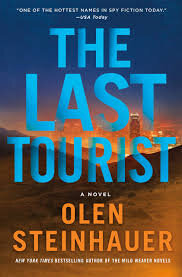REVIEW: 'The Last Tourist' Brings Back One of the Great Modern Espionage Heroes
/
The Last Tourist by Olen Steinhauer (Minotaur Books)
By Charlie Gofen
Olen Steinhauer, perhaps the best contemporary writer of espionage thrillers, first introduced readers to assassin Milo Weaver and the CIA’s ultra-secretive Department of Tourism in 2009. In his Milo Weaver trilogy published between 2009 and 2012 – The Tourist, The Nearest Exit and An American Spy – Steinhauer took the genre to new heights, offering the intricate plotting and global hopscotching of early Frederick Forsyth and the moral nuance of vintage le Carré, but in a modern world with a more complex array of global players.
He also created some memorable characters. The brilliant and quirky oenophile Erika Schwartz of Germany’s Federal Intelligence Service, who calmly tortures Milo and then later becomes an ally. The corpulent intelligence agent Colonel Xin Zhu of China’s Ministry of State Security, who ruthlessly wipes out the covert agents of the Department of Tourism in The Nearest Exit’s haunting final scene (which is the equivalent, in Steinhauer’s world of espionage, to the shock ending of Tom Clancy’s pre-9/11 Debt of Honor, in which an embittered pilot flies a 747 into the U.S. Capitol building during a joint session of Congress). And of course, there’s Milo himself, who refuses at one point to kill a 15-year-old girl he has been ordered to assassinate, opting instead to kidnap her and hide her away because his orders violated his sense of morality.
The trilogy wrapped up nicely when Xin Zhu finally got outplayed and appeared to have been turned, against his will, into an American agent (reminiscent of Colonel Burov at the end of Nelson DeMille’s The Charm School). When Steinhauer moved on new subjects in subsequent books (despite bringing Milo back for a cameo appearance in his 2018 novel The Middleman), we assumed that our tortured hero – literally, Milo is tortured twice in the trilogy – had at last come in from the cold.
But just when we thought Milo Weaver was out, Steinhauer has pulled him back in, and it is a pleasure to welcome him back.
In Steinhauer’s new book, The Last Tourist (“Milo Weaver #4,” in Goodreads parlance), Milo now runs a secret intelligence organization buried deep within the United Nations. The agency, known as The Library, is funded by several nations with whom Milo selectively shares intel. Milo faces some challenges managing these patrons, but the bigger threat emerges from a global consortium with a secret army (including some former Tourists), virtually unlimited resources from huge corporations, and a desire to destabilize the world for their own profit. Naturally, the bad guys meet annually at the World Economic Forum in Davos.
In addition to Milo, several of the characters from the earlier books return, including spymasters Xin Zhu and Erika Schwartz. The multiple plotlines in the new book are dizzyingly complex, but they come together in the end. Steinhauer knows what he’s doing. If he introduces a new technology at the start of the book such as a Chinese-made, 3D-printed plastic pistol that can defeat detectors but is able to shoot only one bullet before the barrel explodes, it’s a safe assumption that this weapon will be employed by the end.
As always, Steinhauer skillfully portrays the paranoia of the spy world, with all of its conspiracies, double agents, and possible moles. He shows his own political leanings a bit more in The Last Tourist than in earlier books, with jibes at President Trump and the rise in authoritarian leadership across many countries. He also incorporates real events into his fiction, such as the kidnapping of hundreds of Nigerian girls by the Islamist terrorist group Boko Haram. Along those lines, readers will feel a certain familiarity with a global Internet company called Nexus that gathers massive amounts of personal information on the citizenry.
The one caveat about The Last Tourist is that it’s not an easy beach read, because it requires a fair amount of concentration to keep the characters sorted out and stay with the plot twists. But for anyone who wants a stylish and sophisticated spy thriller with chess-grandmaster-level plotting, moral complexity, and even social commentary, read Steinhauer.
Charlie Gofen is an investment counselor in Chicago who has taught high school and been a newspaper reporter.










